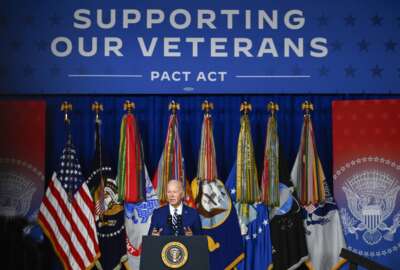Legislation calling for federal hiring managers to focus more on a job candidate’s skills advances to the next step in the Senate
In today's Federal Newscast, a long-awaited bill to reform the government’s hiring process has cleared the way to a possible Senate floor vote.
- A long-awaited bill to reform the government’s hiring process has cleared the way to a possible Senate floor vote. The Homeland Security and Governmental Affairs Committee unanimously advanced the Chance to Compete Act last week. If enacted, the bipartisan bill would create new requirements for agencies in the federal recruitment process. They’d have to focus more on job applicant’s hands-on skills, make better use of subject matter experts, and implement more technical job assessments. The House previously passed the companion bill for the Chance to Compete Act in 2023 in a vote of 422 to 2.(Chance to Compete Act - Homeland Security and Governmental Affairs Committee)
- Lawmakers are getting more answers to their questions on agencies’ return-to-office plans. Governmentwide, roughly 61% of work hours for telework-eligible federal employees have been spent in person. That’s according to new data the Office of Management and Budget released Friday. OMB’s new report to Congress comes in response to lawmakers’ request for details on telework, in-person work and office space plans across agencies. Based on OMB’s data, 15 of 24 major federal agencies are exceeding the administration’s goal of a 50% rate for in-person work hours.(White House details which agencies are ahead, behind on telework goals - Federal News Network)
- Michael Horowitz, who served as the first-ever deputy assistant secretary of defense for force development and emerging capabilities, has left the federal service. Horowitz took over the new office last year after the Pentagon combined the emerging capabilities policy office with the force development office. Prior to his role as deputy assistant secretary, Horowitz served as the director of the emerging capabilities policy office. The new office helps the Defense Secretary to advance priorities related to force development in line with the National Defense Strategy.(Pentagon’s force development policymaker exits DoD - Michael Horowitz X Account)
- Lawmakers are asking the Defense Department to explore portfolio-based management. The Defense Department’s funds are usually tied to a particular program. Dave Tremper, the deputy assistant secretary of defense for acquisition integration and interoperability, says the DoD and Congress are exploring portfolio-based acquisition, which would give the department the flexibility to move money between programs. “That's a conversation that has been stimulated by Congress. The authorizers have asked the department to look at portfolio-based acquisition.” Outside organizations such as the Congressional commission on Planning, Programming, Budgeting and Execution (PPBE) reform recommended the department to embrace this approach.(Congress, DoD to explore portfolio-based acquisition - Federal News Network)
- A new bill would require federal contractors to implement vulnerability disclosure policies or VDPs in order to better protect their systems against cyber threats. The Federal Contractor Cybersecurity Vulnerability Reduction Act, led by Senators Mark Warner (D-Virg.) and James Lankford (R-Okla.), is a companion to the legislation the House passed in May. Under the bill, contractors would have to have formal actions to accept, assess and manage vulnerability disclosure reports to help reduce known security vulnerabilities. Among the other things it would require is for OMB and DoD to update the acquisition regulation requiring contractors to implement VDPs.
- NASA presses the pause button in its SEWP 6 governmentwide acquisition contract. Increasing pressure from industry about the lack of clarity of the SEWP VI solicitation has forced NASA to put its governmentwide acquisition contract on hold. Vendors are unhappy that the SEWP VI program office chose not to answer more than 4,500 questions submitted about the solicitation. With bids due later this month, a letter writing campaign spurred NASA’s decision. NASA updated the solicitation notice on Thursday saying they strive to ensure a transparent process for their industry partners. The space agency says it will announce a new due date for proposals in the near future.(Industry pressure forces NASA to press pause on SEWP VI - Federal News Network)
- The next time the inflation rate goes up, vendors on GSA's schedules contract will find it easier to raise prices. GSA's final rule standardizes and simplifies the schedule clauses for economic price adjustments. The agency says this rule removes certain economic price adjustment requirements to better align with commercial standards and practices. GSA says there were no significant changes to the final rule since it issued a proposed rule in November. During the height of the recent inflation spike in 2022, GSA tested out these new processes to help vendors and agencies adjust to higher prices. The new EPA clause take effect on September 4th.(GSA Acquisition Regulation; Federal Supply Schedule economic price adjustment - Federal Register)
- The Department of Veterans Affairs is taking steps to better protect veterans, service members and their families from fraud and scams. As part of the VSAFE effort, VA’s new website provides information, tools and resources related to common fraud schemes. Veterans can call a centralized phone line to report fraud and for assistance. VSAFE is a collaborative effort involving the VA, the Defense Department and 26 agencies. The new website comes after the VA’s expansion of care and benefits under the PACT Act, making veteran-targeted fraud a growing concern.(VSAFE website, call center to protect vets against fraud - Department of Veterans Affairs)
Copyright © 2025 Federal News Network. All rights reserved. This website is not intended for users located within the European Economic Area.
Eric White
Eric White is news anchor and Federal Drive producer at Federal News Network.
Follow @FEDERALNEWSCAST






